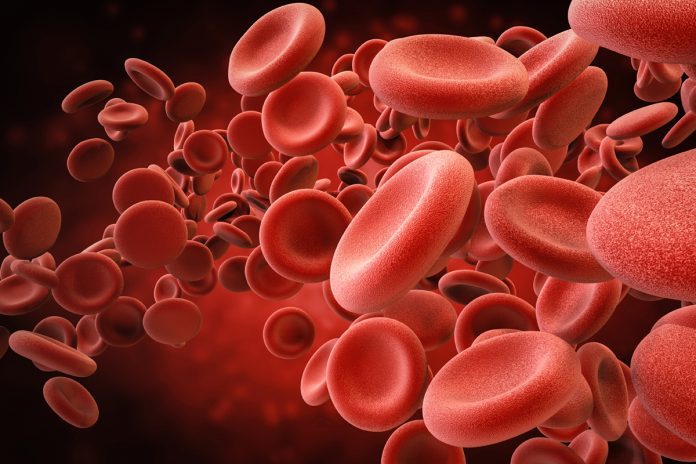Anna Bogdanova from University of Zurich lifts the lid on the vital role of red blood cells in keeping the human brain running and heart beating
Billions of red blood cells run in our veins providing us with oxygen. They keep our brain running, heart beating and muscles bringing us wherever we want. Keeping these tiny cells filled with red cell oxygen carrier hemoglobin happy and healthy is vitally important.
“Thin blood” with low red blood cell counts, a condition known as anaemia, is a global burden that can be life-threatening. According to the World Health Organization, 1.62 billion people on our planet (or 1 in 4 people) are suffering from anaemia. 47.5% of all pre-school children are anaemic.
The large scope of patients and the scale of health problems they face turns fighting anaemia from solely a medical problem to a global socio-political economic challenge. Malnutrition and the treatment of iron deficiency led to improved anaemic patients results. However, this is not a viable solution for anaemia patients with hereditary conditions. In patients with ‘’rare’’ anaemias v mutations in genome result in the production of abnormal hemoglobin, changes in cell membrane architecture and pathologies – related to the inability to maintain energy balance or resist oxidative stress. Hereditary hemoglobin instability in red cells of hundreds of thousands of children born with sickle cell disease in African countries takes the lives of approximately half of them before reaching five years of age.
Living with such severe disorders as sickle cell disease or thalassemia means pain, disability and a need for regular blood transfusions from a young age. Many patients with more ‘’exotic’’ rare red cell diseases remain undiagnosed or maltreated around the globe. We often can determine the genetic basis of a disease, but this does not imply a cure exists. No gene editing medication is available in clinics to treat red blood cell disorders or any other disease.
So, we are left to struggle with the symptoms by transfusing stored blood, managing pain and coping with stroke, lung and liver problems and multiple organ failures as best as we possibly can. Therefore, we need a viable solution and hence this project, RELEVANCE (Regulation of red cell life-span, erythropoiesis, survival, senescence and clearance) Consortium.
The successful treatment of red blood cell diseases is impossible without a deep understanding of the biological processes that control red cell production, ageing and destruction. So far, we still cannot harness and control these processes pharmacologically or by the development of preventive lifestyle programmes to cure all these billions of patients with anaemia. The ability to engage the hidden forces our red blood cells to adapt to stress is a key to the final solution.
The challenges of the 21st century within the red blood cell research field include:
- Fighting all forms of anaemia;
- Development of new drugs and therapeutic approaches for treatment of not-so “rare” anaemias that can be afforded by African countries, thus, greatly improving the quality of life of these patients;
- Development of new devices and new tests so that researchers/clinicians can perform simple diagnosis and monitor severity of rare anaemias;
- Generating more red blood cells outside the body that may be used for transfusion (preferably patients’ own blood);
- Learning more about the ways red blood cells respond to stress and how to use organism’s natural defenses to fight against disease;
- Achieve better performance in sports athletes.
These problems may only be solved by joint efforts of clinical hematologists, blood banking experts, researchers and industrial engineers. This type of novel approach must be done to drive the research forward. This demand and challenge is being met by several EU-scale consortia, RELEVANCE being one of them.
RELEVANCE (Regulation of red cell life-span, erythropoiesis, survival, senescence and clearance) Consortium is powered by the EU funding within the Marie Skłodowska-Curie Actions Program. Our research team is comprised of members in a diverse set of fields ranging from biophysics to physiology to biochemistry and genetics. Collaboration involves both clinical and industrial partners based in Germany, France, UK, Italy, Switzerland, Spain, the Netherlands and Denmark.
RELEVANCE has international and global implications with respect to red blood cell research, personalised medicine and sports medicine. Consortium partners are discovering new information on the fundamental mechanisms controlling red blood cell turnover, structure and function in healthy vs anaemic patients. Initial findings led to the development of new technologies based on single cell analysis, imaging and microfluidic and laser technologies. They can be implemented to study red blood cell selection, investigating properties of red blood cells and faster and more accurate clinical diagnosis and evaluation of anaemic patients. We expect that the personalised medicine field to expand greatly based on the RELEVANCE work. Blood is in all of us and without it, we would cease to exist.
RELEVANCE is an Innovative Training Network that educates 15 early stage researchers from all over the world preparing them for future multidisciplinary careers in science, translational medicine and/or industry. By joining the network, the trainees get a unique opportunity to participate in all kinds of research activities and development of new industrial prototypes together with scientists and clinicians. During the coming months, we shall be sharing with you our exciting findings, achievements and adventures in the world of red blood cells.
This project has received funding from the European Union’s Horizon 2020 research and innovation programme under grant agreement No 675115 – RELEVANCE – H2020-MSCA-ITN-2015/H2020-MSCA-ITN-2015.
Please note: this is a commercial profile
Professor Anna Bogdanova
Head of Red Blood Cell Research Group
University of Zurich
Tel: +41 44 635 8811











